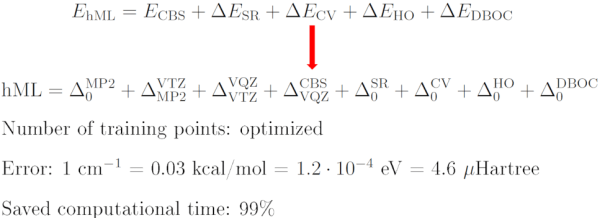hML: Hierarchical Machine Learning for PESs

We introduced hierarchical machine learning (hML) approach for building highly accurate potential energy surfaces from multiple Δ-ML models, each trained on semi-automatically defined training points.
Building highly accurate potential energy surfaces (PESs), e.g. for rovibrational spectrum simulations, require many single-point calculations with very high-level quantum chemical (QC) methods on large number of grid points. Thus, it quickly becomes computationally prohibitive. Machine learning is a powerful tool to reduce the cost of PES generation, but using it for learning directly energies at the target level is inefficient as it can better be used to learn individual QC correction as in delta-learning.
Delta-learning is a powerful tool to obtain very accurate ML predictions using only small amount of training data, while retaining the robustness of the underlying low-level QC method. Recently several generalizations of delta-learning were suggested by combining several delta-learning models trained on corrections obtained at different QC levels. However, as the number of possible delta-learning models increases it is hard to choose the optimal training sets before generating expensive QC reference data. In our new hML approach we suggest an optimization procedure doing exactly this.
We applied it to optimize the composition of the hML model and to find the training sets for each constituent delta-learning model to obtain the PES of a small molecule with spectroscopic accuracy. This hML PES was generated 100 times faster than the original ab initio PES and is fully analytical.
All ML models were built with MLatom and using kernel ridge regression and our RE descriptor. To significantly reduce the number of training points, structure-based sampling and self-correction was employed as implemented in MLatom.
The manuscript is a part of JCP Special Topic on Machine Learning Meets Chemical Physics with Guest Editors Michele Ceriotti, Cecilia Clementi, and Anatole von Lilienfeld.
- Pavlo O. Dral, Alec Owens, Alexey Dral, Gábor Csányi, Hierarchical Machine Learning of Potential Energy Surfaces. J. Chem. Phys. 2020, 152, 204110. DOI: 10.1063/5.0006498.
0 Comments on “hML: Hierarchical Machine Learning for PESs”